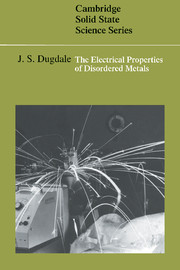Book contents
- Frontmatter
- Contents
- Preface
- 1 Context and content
- 2 Production and structure of metallic glasses
- 3 Electron transport in metals: introduction to conventional theory
- 4 Scattering
- 5 Simple liquid metals: Ziman theory
- 6 Phonons in disordered systems
- 7 Interactions and quasi-particles
- 8 Transition metals and alloys
- 9 The Hall coefficient of metallic glasses
- 10 Magnetoresistance
- 11 Electrical conductivity of metallic glasses: weak localisation
- 12 The interaction effect or Coulomb anomaly
- 13 The effect of the Coulomb interaction on conductivity
- 14 Influence of a magnetic field on the enhanced interaction effect
- 15 The thermopower of metals and alloys
- 16 Comparison with experiment
- Appendices
- Notes
- References
- Index
12 - The interaction effect or Coulomb anomaly
Published online by Cambridge University Press: 21 January 2010
- Frontmatter
- Contents
- Preface
- 1 Context and content
- 2 Production and structure of metallic glasses
- 3 Electron transport in metals: introduction to conventional theory
- 4 Scattering
- 5 Simple liquid metals: Ziman theory
- 6 Phonons in disordered systems
- 7 Interactions and quasi-particles
- 8 Transition metals and alloys
- 9 The Hall coefficient of metallic glasses
- 10 Magnetoresistance
- 11 Electrical conductivity of metallic glasses: weak localisation
- 12 The interaction effect or Coulomb anomaly
- 13 The effect of the Coulomb interaction on conductivity
- 14 Influence of a magnetic field on the enhanced interaction effect
- 15 The thermopower of metals and alloys
- 16 Comparison with experiment
- Appendices
- Notes
- References
- Index
Summary
Introduction
There is a further effect that arises in systems in which there is heavy elastic scattering of the conduction electrons; it shows itself at low temperatures through the unusual temperature and magnetic field dependence of the electrical resistance and since its contribution can be confused with that from weak localisation it is important to describe its consequences before we try to complete the survey of that effect.
The localisation effect described in the last chapter involves single electrons and would exist even if these electrons did not interact with each other. By contrast this new effect, sometimes called the Coulomb anomaly, arises ultimately from the interaction of one electron with another. Hence its rather uninformative alternative name ‘the interaction effect’, which does however emphasise that it could not occur with noninteracting electrons. The ‘enhanced interaction effect’ is perhaps a better name.
If, in an ordered metal, an electron in a plane wave state of wave vector k is scattered into state k′, we must have k′ = k + q where q is a Fourier component of the scattering potential. In a disordered metal, however, there is an uncertainty in k because of the scattering; this uncertainty is of order 1/l, where l is the relevant mean free path. Thus the above relation will break down if the scattering vector q is less than 1/l. This suggests that any unusual effects will occur at small q and that our interest will focus on states for which ql ≤ 1; this means that the smaller the mean free path involved, the greater the range of q-vectors that can contribute to the effects.
- Type
- Chapter
- Information
- The Electrical Properties of Disordered Metals , pp. 140 - 166Publisher: Cambridge University PressPrint publication year: 1995

